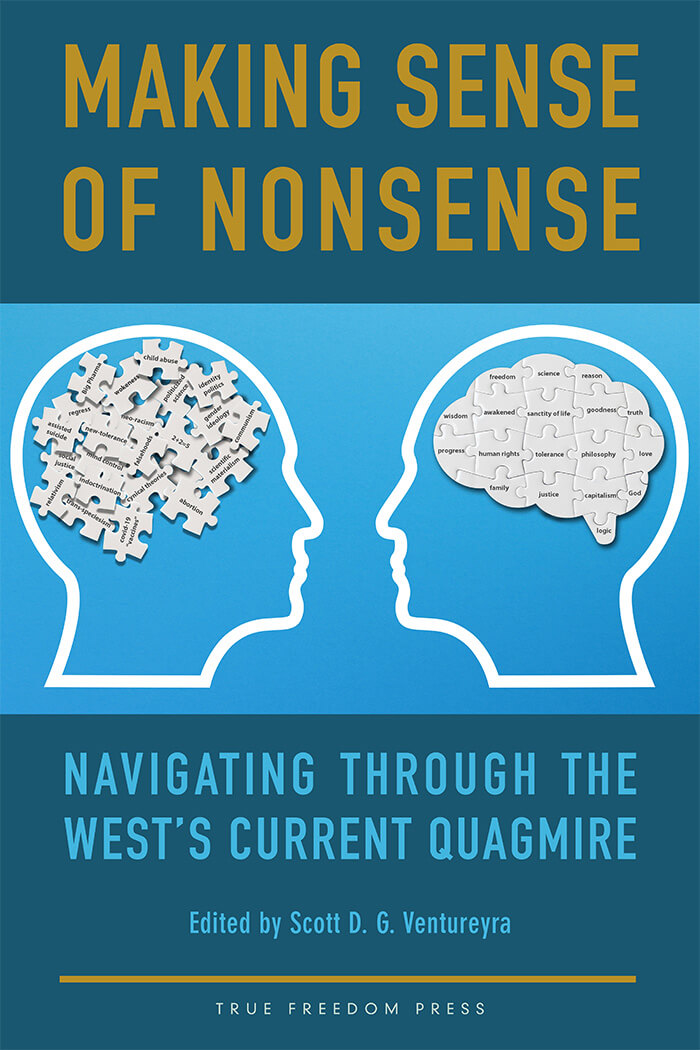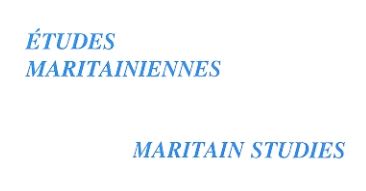
A review by M. Oliver Heydorn of Making Sense of Nonsense

Originally published in Maritain Studies/Études maritainiennes 38 (2022): 133-136.
Making Sense of Nonsense reviewed by M. Oliver Heydorn in Études maritainiennes – Maritain Studies, Volume 38: 133-136 (November 2022).
M. Oliver Heydorn is a philosopher and a proponent of social credit economics (not to be mistaken with the infamous social credit system). For more information you can visit The Clifford Hugh Douglas website on the study and promotion of social credit. I hope to interview him once I have my upcoming podcast started later this year (most likely in the fall of 2024). For an introduction to social credit economics, see the video below the review, which presents introductory material.
Making Sense of Nonsense: Navigating through the West’s Current Quagmire can be purchased on the True Freedom Press website and on Amazon (click on the links).
One of the first things to strike the reader of Making Sense of Nonsense is the great breadth of topics that are addressed or at least touched upon in the course of its pages. Unfortunately, the manifestations of nonsense in our contemporary society are legion. From gender theory to climate ideology, from legalized abortion to unjustified and indeed dangerous restrictions on free speech, the book’s many essays make it clear that what is, in fact, nonsense and demonstrable nonsense at that, has become ubiquitous in the contemporary West, albeit in many variations and gradations. In approaching the hot topics or key issues that mark the on-going battles we are made to endure and the progressive retreat we made to suffer from anything resembling traditional, Christian civilization, we are simultaneously introduced, or re-acquainted as the case may be, with the various -isms that stalk us: naturalism, materialism, scientism, Marxism, socialism, Darwinism, Freudianism, deconstructionism, post-modernism, and the very latest – ism, “wokeism”. This is the book’s first achievement: an outline or adumbration of the various points of conflict between the traditional conception and practice of Western civilisation and its prospective post-Western replacement in combination with an exploration of
the chief ideologies which have been developed and then marshalled as weapons in favour of the latter’s anticipated triumph.
At the same time, the book recognizes that nonsense policies and their ideologically underpinnings are not just accidental or adventitious nonsense, or nonsense that has spontaneously developed, ‘evolved’, or emerged out of the ether. Rather, a good deal of the nonsense (or at least a large part of it) exists because it is actually part of a conscious agenda on the part of powerful forces that are active in the world today. Rather than shying away from what critics and proponents alike have termed “The New World Order,” Making Sense of Nonsense boldly acknowledges the existence of this project – i.e., this attempt to centralize power on a global scale, head-on. For example, certain contemporary events and developments such as the controversies surrounding the Covid-19 phenomenon and its accompanying experimental jabs are discussed at length in some of the essays, as is the emergence of the World
Economic Forum as a political force seeking to implement its sinister 2030 agenda.
The recognition of the NWO and its key players, institutions, strategies, and tactics is of crucial importance. There is indeed a conscious, organized movement to create or otherwise take advantage of public crises in order to elicit a certain collective response to those crises. Those responses can then be cited as the necessary justifications for moving society in the direction of tyrannical policies that will further increase the centralization of power in all of its various forms. As centralized power increases, individuals necessarily become more and more disenfranchised. The state becomes all-powerful as both God and the human being are overshadowed. Without understanding this factor of conscious, intelligent action in our present discontents, we cannot hope to effectively respond to or to counteract those who would wish to undermine and corrupt our civilization. What is ultimately at stake is power, i.e., control over policy, and the menace of the anti-Christian ‘philosophy’ (the word philosophy is to understood here in the broadest sense, i.e., as a vision of
how the world is, could be, and should be) that animates those power-seekers who would wish to impose their views on the rest of us in order to advance their own benefit narrowly conceived. The nonsense ideologies that are invoked to justifying the adoption of nonsense policies in reference to nonsense issues are just tools in the pursuit of power. Once this is understood, it becomes a little easier to ‘make sense of all the nonsense’. Various essays in the book explore the economic, political, and cultural agenda of the world’s antifreedom power-mongers from this precise angle.
But there is yet a third aspect to our contemporary situation – it may even be regarded as the most important aspect – which is extensively touched on in Making Sense of Nonsense by two of its essays: “The Great Reset and the New World Order” by Phil Fernandes and “A Message to All Humanity, All Governments, All Royal and Financial Elites (One Percent Group)” by Ton Laurijssen. This has to do with the role which the reigning financial system plays as the underpinning and driving force behind the whole NWO project. To remake the world by remaking identity, gender, religion, the economy, politics, culture, and philosophy, etc., is a grandiose project which could never have been conceived, let alone pursued with such apparent efficacy and superficial success, had it not been for two things: 1) the financial, economic, and hence personal dissatisfaction which is caused by the structurally dishonest and dysfunctional financial software on which we attempt to run our economies and 2) the overwhelming power, wealth, and privilege which the same system unjustly centralizes in the hands of a few, namely those who own the system and/or otherwise benefit from its operation. I submit that it is the financial system (i.e., the banking, cost-accountancy, and taxation systems) which is the very engine that is powering the NWO and is responsible for the conceptualisation, propagation, and application of so much nonsense in our world as a means to that end. Were it not for the illegitimate power which money has acquired under the existing credit monopoly and its deployment in the pursuit of anti-social policies there would be a lot less nonsense about and the need for books attempting to make sense of it all (as brilliant as these may be) would be greatly diminished.
Based on my own extensive research, I would suggest that it is in an analysis of the financial system along the lines provided by the British engineer, Major C.H. Douglas, and the original Social Credit (his brainchild), that one may find the ultimate explanation, at least on an earthly or natural level, for the existence of so much nonsense. If we adopt the adage “follow the money” in approaching the phenomenon of nonsense, we can make as much sense of the nonsense as nonsense will allow and thereby discover that making sense of finance is the one thing necessary par excellence for making sense of the nonsense.



